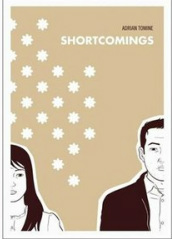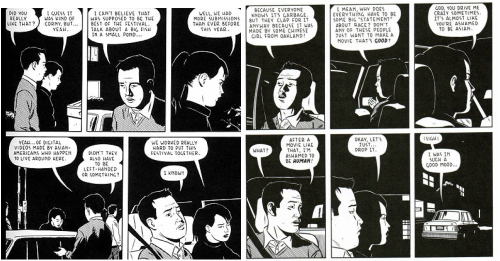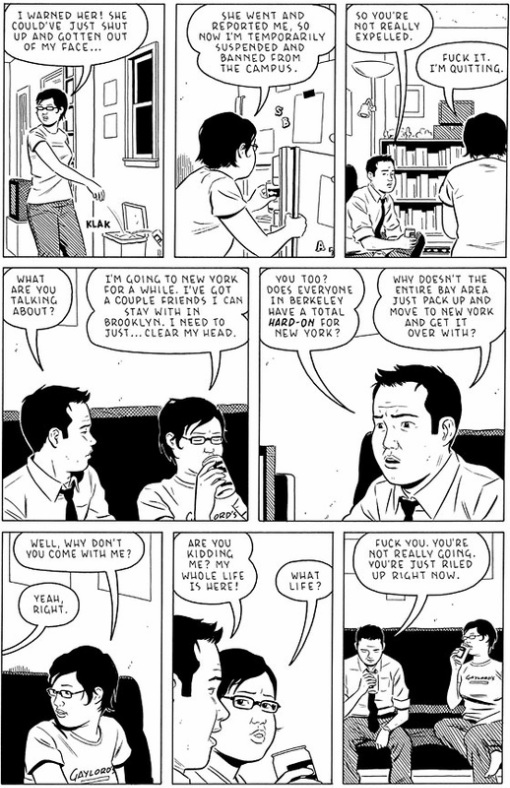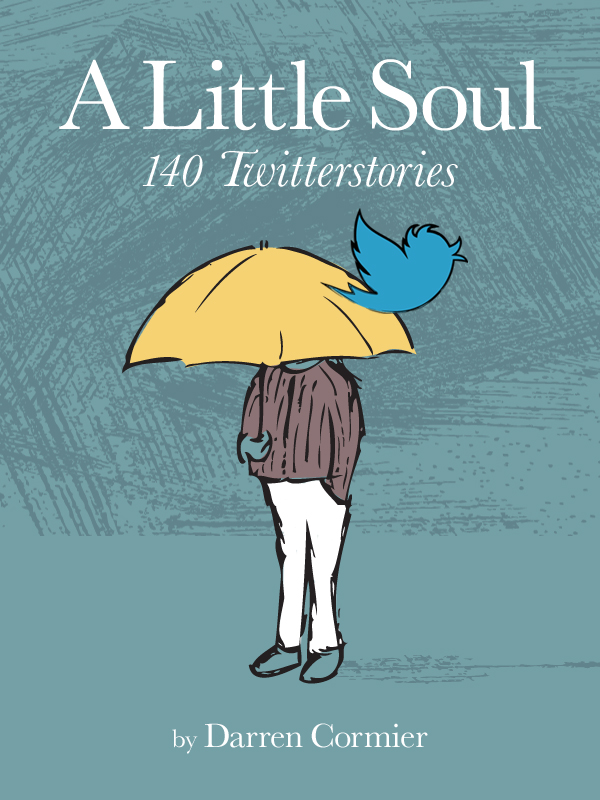
A friend recommended Gabrielle Bell and, after seeing my review of Lucky, asked if I had read his other recommendation: the Optic Nerve series. I told him the library did not have it, but they did have Tomine's Shortcomings. "You read Shortcomings?" Shortcomings, although his first full-length book, is not usually the first book used to introduce someone into Tomine. Something comparable would be recommending Finnegan's Wake to someone who has never read Joyce, or proposing to someone on the first date: it's generally not a good idea, you want to ease into things like that.
Shortcomings is generally considered Tomine's masterpiece, at least until his next book comes out. It's ostensibly about Ben Tanaka, one of the most unlikable protagonists in recent memory. Ben is a dick. He's critical of everyone and everything; he picks fights with his long-time girlfriend Miko, he mocks the films in the festival she organized; and, like most flawed narcissists, he has a magnifying glass on everyone's faults but a blind spot towards his own.
The disintegrating relationship between Ben and Miko is the catalyst Tomine uses to explore race and culture, and how societal and cultural expectations affect self-identity, if at all. As you can see, it's pretty light reading. At one point Miko accuses Ben of deliberately harboring hatred towards Asian culture, thereby implicating both Ben and Miko as objects of his ire. She points out that all the porn Ben owns is of white, blond women, an accusation that his fantasies do not include Asian women, and therefore he does not like Asian women. Ben denies this and in the next scene Ben is criticizing the technical quality of the DVD itself. However, the first two dates he goes on after Miko moves to New York to pursue film, are with white, blonde women, perhaps affirming Miko's accusation all along. Does this make Miko right? Does Ben have a type? Does Ben have issues with his own culture and what is expected of him? Why should Ben, as an Asian male, be expected to date Asian women? Should there be any self-inflicted expectations based on culture?
To his credit, Tomine does not answer any of these questions, nor does he judge any of his characters. He doesn't show Ben in a needlessly negative light or as a misunderstood genius who's just too hurt inside to show his tenderness. Ben's a complicated, caustic human being. Tomine's graphic novels work like a stageplay. We don't know the internal motivations of the characters, or their background; we're just observers.
I originally intended to write a negative review given the expectations I had after reading the dust jacket. It reads:
By confusing their personal problems with political ones, Ben and Miko are strangely alone together and oddly alike... Being human, all too human, they fail to see that what unites them is their hypocrisies, their double standards. This gray zone between the personal and political is a minefield Tomine navigates boldly and nimbly. The charged, volatile dialogues that result are unlike anything in Tomine's previous work or, for that matter, comics in general.
I saw the societal and cultural implications, and thought it raised great questions about culture and race and self-identity that are very rarely covered in literature, let alone comics. I thought it raised strong questions about sexuality and gender within that cultural landscape as well. I just didn't see the "political" implications. But I couldn't bring myself to write a negative review: it is insightful, provocative, well-written. The characters are three-dimensional, complex, sometimes unlikeable. The drawings fit the story, they possess a minimalist Mary Worth style. Compare below:
But that raised a different question for me. If I didn't catch everything that supposedly was explored in the book, did that make me a bad reader? Should we hold ourselves accountable to dust jackets? Obviously, no, on both accounts. We should not hold ourselves accountable to a dust jacket, and it doesn't make us bad readers if we "don't get it."
My issue came not with the book or with Tomine. It was with the dust jacket and my interpretation of the word "political". I think of "political" and I think of lawmakers, politicians, and the daily political theater of our Congresspeople. Perhaps naively (intransigently?) I think the word "politics" should be relegated to this arena, and not mixed in with what has become accepted lingo: cultural politics, sexual politics, office politics. Let's leave the word "politics" where it belongs: with the politicians.
I shouldn't hold the dust jacket or a single word against the book. Tomine didn't write the dust jacket. The publisher did. Tomine did write the contents inside the book, though. And this book, and Tomine's work I whole-heartedly recommend.



 RSS Feed
RSS Feed

